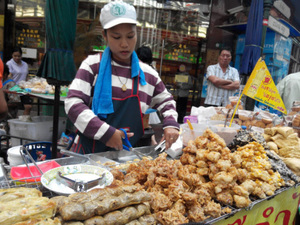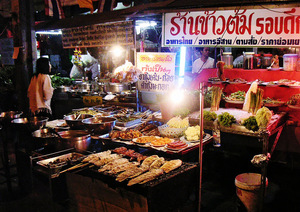Supermarket watch Asia bulletin, Issue 6, May 2017
Editorial: "Food safety" as a weapon against small food vendors and producers
Concerns about food safety and hygiene have underpinned some governments’ decision to ban street vendors and close down fresh markets in recent years. Bangkok’s street vendors are the latest victims of this ban as the city government announced it will clean out all street vendors by the end of 2017.
Experiences in other parts of the world show a similar situation. In January this year, Harare’s City Council in Zimbabwe accused informal food vendors of spreading typhoid. The council then attempted to confiscate and destroy all perishable food items that were being hawked in the central business district. Many vendors fought back, resulting in deadly clashes.
"If they were responsible enough and cared for the people, then they should have engaged in a process of finding ways of creating a conducive environment so that they can support the efforts of Zimbabweans who are trying to earn a genuine living," said Ronald Mureverwi of the National Vendors Union Zimbabwe. "Vending is not criminal in any way," he added.
The main food safety hazards are not caused by small-scale food vendors and producers, but by the industrial food system and its massive food factories. The recent scandal in Brazil involving JBS, the world's largest meat company, proves this once again. JBS was reported to have bribed government officials to approve the sale and export of contaminated meat around the world. It is alleged that some of the meat, including sausages and cold cuts, was rancid adulterated meat, masked by applying acid to cover the smell, then sold to schools and to Walmart, the retailing multinational.
ACROSS THE REGION
Banning of street food in Bangkok, Thailand
At the end of a long day, and up to the early hours of the next, Bangkokians often stop off on their route home to eat at one of the thousands of street food stalls all around the capital. The highly flavoured foods are mostly cooked on site and sold at low prices. Both stallholders and customers come from all regions of Thailand and many more workers and diners come from elsewhere in the region. Nowhere else, perhaps, are Thailand’s diverse food cultures better represented. The foods range from the familiar to the unidentifiable, from simple to elaborate. The makeshift stalls are frequently crowded, harshly lit, open to all weathers, and the service is fast and noisy.
For the urban poor, street vending can be a vital source of their income (Bhowmik, 2005). On the face of it, the incomes of regular customers and stallholders do not appear to be so different, though it’s hard to tell. There have been few recent surveys into this sector on employment or incomes. What is certain, these stalls appear on every main street, near every transport hub, and housing area. Most likely, they involve millions of people.
However, on the 18th of April 2017, The Nation reported that the Bangkok Metropolitan Administration (BMA) will ban all street food vendors by the end of the year. According to a Bangkok Post news report, this banning of street food is part of the clean-up campaign orchestrated by the Thai government, currently ruled by the National Council for Peace and Order (NCPO). A huge outcry from the local public, street vendors made headlines among local media outlets (see [1] [2] [3] [4]) (watch a short video survey by VoiceTV 21). This also did not escape the international news (see [1] [2] [3] [4]). Bangkok, is currently the world’s most visited city, with an estimated 21 million visitors in 2016, and was recently ranked for the second time as the best city for street food by CNN.
The BMA says it plans to implement stricter street vending regulations to tackle illegal street vending, enhance food hygiene standards, and return pavements to the pedestrians. But taking pavement back to the pedestrians will clearly come at a huge cost to street vendors and will limit the options for their customers. If streets will be cleared, how else would the vendors make a living? Is the government planning ways to guarantee their rights to livelihood? It seems unlikely. And why are cleared pavements so important in each of these cases? Bhowmik (2005) pointed out that the obstruction of traffic is frequently used as justification to remove or restrict street stalls, while there is little evidence of this. Where else could customers go to find their evening meals? This abrupt change seems set to create disadvantages to many people, and designed to benefit the restaurants legally set up away from the streets - increasing the market share of the food franchise companies, or 24-hour food convenient stores.
Proponents of the ban argue that street foods are unhygienic. Certainly, standards of hygiene along the street are varied. The great advantage of street food is that most meals are freshly cooked. On what criteria is street fare being compared? Is the food served in off-street establishments more nutritious? Is it more diverse, or more free from chemical pesticide residues? Past evidence from Thai PAN surveys suggested that fruits and vegetables from fresh markets and food trucks do not score worse than fruits and vegetables from brand name supermarkets. Where is the evidence to say that street food tends to be less nutritious, less healthy, or less value for money than mass-produced food in major commercial venues?
This announcement has not come out of the blue. Several attempts have been made to give effect to this idea of cleansing the streets. But this time, the military government and its unchallengeable powers under Article 44 of the new Constitution make it more likely that the policy could be implemented.
The state of democracy and food democracy are integrally related. Food democracy was coined by Professor Tim Lang during the mid 1990s, and has been developed by Lang and others into a concept that not only enshrines the right of all people to an “adequate, safe, nutritious, sustainable food supply”, but goes beyond this to “stress decency and social justice in the food system’s wages, working conditions, and internal equity”, and has become a “framework for decentralising control over the food system” (Booth & Coveney (2015). The potential destruction of income and food security for Bangkok’s urban poor and low-wage workers of a street food ban in Bangkok underlines why social justice must be at the core of Thailand’s food system. Democracy is vital for allowing all people a chance at meaningful participation in the way proposed changes will affect their family’s lives and our society.
Article by:
BioThai info team
e-mail: [email protected]

